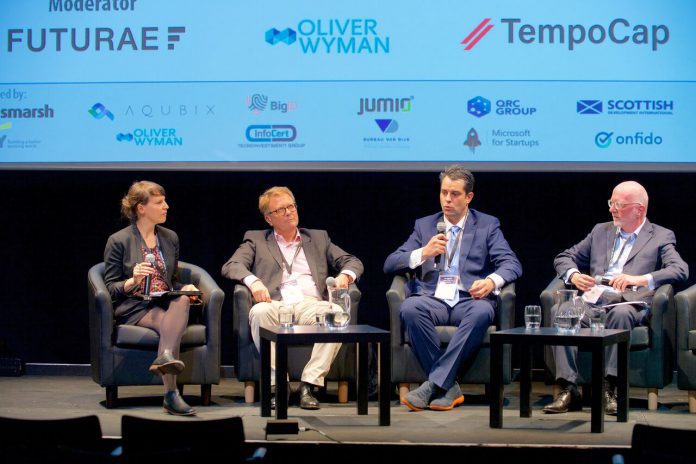Machine learning, AI and blockchain can drive cybersecurity forward; however, more investment and urgency is needed in Europe, according to a panel at the Global RegTech Summit.
Following a number of high profile attacks and regulations forcing organisations to better protect their data, cybersecurity is top of the agenda for the financial services industry.
The panel at the Global RegTech Summit which included, senior staff from Futurae Technologies, Oliver Wynman, Tempo Cap, and TS Lombard, discussed how innovation in technology could propel cybersecurity forward.
Having hands on experience in using machine learning for authentication, Sandra Tobler, co-founder and CEO of Futurae, asked the rest of the panel what technology will influence the cyber industry for next four or five years?
Rafael Narezzi, CIO/CSO at TS Lombard, told the audience that blockchain and decentralisation will play a key role going forward
“There are various projects on the area and I think a centralised system is very effective because you cannot attack a central point. So, in the future there will be a database that normally operating inside of the blockchain.
“In terms of a perspective attacker, how could he attack a central point if your database is splitting various notes on the blockchain. So, it’s very unlikely for him to assemble all these notes that has information off your data in order to collect the database.”
Mark James, partner at Oliver Wyman, also suggested that decentralisation and blockchain will have a massive impact on the industry, but he also discussed the importance of AI and machine learning.
He told the audience that Oliver Wyman is building in the AML and in the cyberspace, and can already see ‘fantastic applications’ of machine learning to ‘good effect’.
“As someone who’s first computer language was Fortran 77, I’m blown away at how easy it is these days to create natural language processing and stuff using open source tools. I think that will continue and that we should leverage that to the utmost.”
He also told the audience that CSOS and information security officers are reaching for machine learning, when in fact simple statistical analysis and scatter plots would tell you a lot. “There’s an awful lot of improvement that we can make in our controls using standard techniques and we shouldn’t be too quick to dismiss those.”
Technology is also outpacing the industry’s ability to generate the control frameworks needed according to James.
“It’s almost like being in a cockpit of an airplane and trying to fly it and you have 10,000 buttons, all of which are flashing, and you don’t know which one to pick. We need to harness technology, I think, to make the control of cyber along all these different dimensions usable,” he added.
Before sharing his view on technogoly, Rafael Narezzi, CIO/CSO at TS Lombard, pointed towards the cybercrime industry being a business-driven module, with every dollar they spend or invest, they have to get a percent back.
“So, it’s a huge number and I’m not saying that the government doesn’t do enough, but the money that the cybercrime industry is making following the Bromium report is 1.5 trillion dollars. So, it’s a huge amount of money.”
He told the audience not enough money is being spent on cybersecurity and people still not believing it is a threat.
“So, there is a lack of clarity there. I think machine learning will be a great help in order to manage the data or the logs that we provide. It is far superior that a human can control.
“Machine learning will be helping most of the organizations to be more accurate into deal with a cyber threat, in case something comes. But machine learning will not replace the human brain. At least not yet.”
Pierre agreed that more money has to be pumped into cybersecurity due to its importance to the industry, advocating Europe to follow the examples laid down by Israel and the US.
“There’s too much money coming from governments, UK or European Investment Fund, etc. going into generic technology funds. It’s time for Europe or European governments to wake up and to focus very particularly on funding cybersecurity technology companies, to really help this modern stuff.
“That’s what Israel does as well and that’s why they are very strong in security. We need that. That’s where our money would be well spent and where people would come in, and as you see in the US for example. That’s something of concern and I think we don’t have this urgency in Europe. I don’t know why, but we don’t have it on government level. We don’t have it on corporate level. We don’t have it on banking level and I think that needs to change.”
Copyright © 2018 RegTech Analyst











